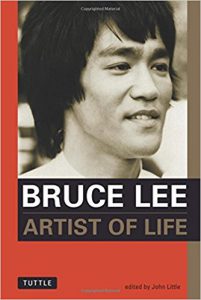 This book showcases Bruce Lee’s private notes and letters, revealing his philosophies and advice to others.
This book showcases Bruce Lee’s private notes and letters, revealing his philosophies and advice to others.
Bruce Lee saw himself as an ‘artist of life’, always trying to be the best version of himself, looking for self-actualisation, rather than self-image actualisation. The first one refers to being honest with oneself and always looking for personal growth with a desire coming from within. The second one refers to the “default setting” for most people that only live for their image – worrying about what other people would think about them.
He tries to simplify these ideas in the following paragraph.
A self-willed man has no other aim than his own growth. He values only one thing, the mysterious power in himself which bids him live and helps him to grow. The power can be neither preserved nor increased nor deepened by money and power, because money and power are the invention of distrust. Those who distrust the life-giving force within them, or who have none, are driven to compensate through such substitutes as money.
And on this one:
It is easy for me to put on a show and be cocky and then feel pretty cool. Or I can do all kinds of phony things and be blinded by it. Or I can show you some really fancy movement. But to express oneself honestly, not lying to oneself—that, my friend, is very hard to do
Each man must seek out realisation himself. No master can give it to him.
Bruce Lee’s hunger for “knowing more” and personal development was remarkable.
I am a teacher as well as a student because I am forever developing and simplifying, but mainly I am known as a teacher, and a notoriously expensive one at that, for when my time is demanded of me my learners pay for its worth.
We play different roles during our life; sometimes we can be a teacher to others (family, friends, other) and other sometimes our role shifts to a learner when we are looking for answers. This was his philosophy for “teachers” and “learners.”
A teacher, a really good teacher, functions as a pointer to truth, but not a giver of truth. He employs a minimum of form to lead his student to the formless. Furthermore, he points out the importance of being able to enter a mold but not being caged in it, or to follow the principles without being bound by them. For a pliable, choiceless observation without exclusion is so essential in the cultivation of martial art—an “altogether alert awareness” without its center or its circumference, to be in it, but not of it. Above all, a teacher should not depend on a method and drill systematic routines; instead, he studies each individual student and awakens him to explore himself, both internally and externally, and ultimately to integrate himself with his being. Such teaching, which is really no teaching, requires a sensitive mind with great flexibility and adaptability, and it is difficult to come by nowadays.
Sincere and serious learners are equally difficult to come by, too. Many students are five-minute enthusiasts; some of them come in with selfish motives, but unfortunately, most of them are secondhand artists, basically conformers. An average practitioner in the martial art seldom learns to express himself; instead, he faithfully follows an instructor, the authority figure, and an imposed pattern. I guess a person finds more security in mass imitation; unfortunately what is nurtured is the depending mind rather than independent inquiry. These tradition-bound teachers reinforce the conditioning through their daily teaching and will not try to understand reality as it is because it condemns them. As time goes by their practitioners might understand some routines and might even become skillful according to a particular pattern. However, they have not come to understand themselves. In other words, they have gained control of the manipulative routine skill they have, but not what they are in themselves.
As human beings, we are ‘work in progress’, and to Bruce, it was clear that self-knowledge is a continuing – non-stop process.
through self-exploration, flexible awareness, and self-expression one finds himself. Such self-knowledge is a continuing process, and the artist that possesses such quality expresses himself with the utmost freedom.